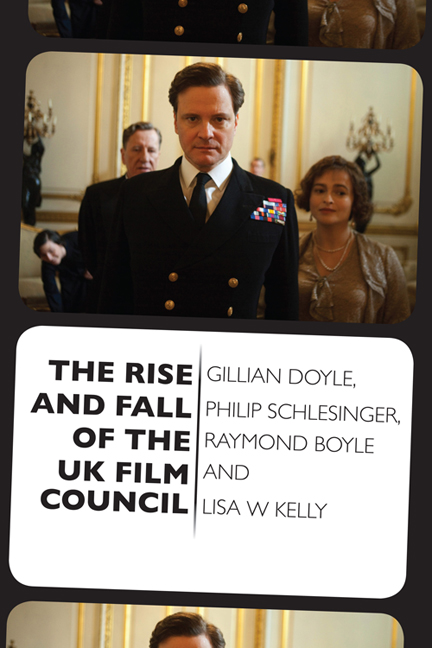Book contents
- Frontmatter
- Contents
- List of Tables and Figures
- Preface
- Part I Background
- Part II Agenda for the UK Film Council
- Part III Impact
- 5 Flying Too Close to the Sun?
- 6 The Production Funds
- 7 Digital – A Missed Opportunity?
- 8 Performance against Objectives
- Part IV Strategic Lessons
- Notes
- Bibliography
- Appendix: UKFC ‘Family’ of Partner Organisations
- Index
8 - Performance against Objectives
from Part III - Impact
Published online by Cambridge University Press: 05 September 2016
- Frontmatter
- Contents
- List of Tables and Figures
- Preface
- Part I Background
- Part II Agenda for the UK Film Council
- Part III Impact
- 5 Flying Too Close to the Sun?
- 6 The Production Funds
- 7 Digital – A Missed Opportunity?
- 8 Performance against Objectives
- Part IV Strategic Lessons
- Notes
- Bibliography
- Appendix: UKFC ‘Family’ of Partner Organisations
- Index
Summary
Introduction
This chapter provides an analysis of the UK Film Council's performance over its lifetime in relation to some of its key stated policy objectives and funding schemes and initiatives. It is well recognised that cultural industries, including film, produce economic and non-economic impacts but measuring these impacts can prove challenging (Bakhshi et al. 2008; Throsby 2004). Similarly, measuring the performance of public bodies whose job it is to support cultural industries is fraught with difficulty, not least because such bodies are accountable to diverse stakeholder groups and the objectives that they are, or ought to be, pursuing can be a matter for divided opinions. The conditions surrounding the inception and development of the UK Film Council made this a distinct organisation with few obvious comparators around the globe. Therefore, assessing the Film Council's performance, when we are discussing a support body with a wide remit whose sense of mission shifted over its lifetime, is by no means an easy task.
Our analysis draws extensively on secondary source statistical data and, where possible, we have used data for the years starting in 2000, when the Film Council began operating, up until 2011, when responsibility for film in the UK passed to the BFI. Mindful of the fact that historical data is subject to revision, we have relied heavily on the most up-to-date published sources in the BFI Statistical Yearbook 2014. Where comparative data over the lifetime of the UKFC is not available, we refer to the statistical yearbooks published by the UKFC from 2002 to 2010 and the BFI thereafter. Where substantive variances in methods of data collection occur, we have sought to ensure reliability by narrowing the focus to more limited periods within the 2000–11 time frame. In addition, bearing in mind that time lags may occur between the instigation of schemes and interventions and the achievement of desired impacts, some of the data used in our analysis relates to surrounding periods before the creation, and after the closure, of the Film Council.
Sources of data drawn upon include the UKFC's Group and Lottery Annual Report and Financial Statements (2000–10) and its Annual Review (2000–6).
- Type
- Chapter
- Information
- The Rise and Fall of the UK Film Council , pp. 127 - 146Publisher: Edinburgh University PressPrint publication year: 2015



